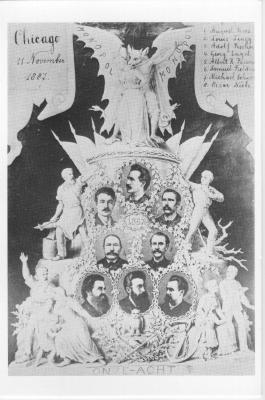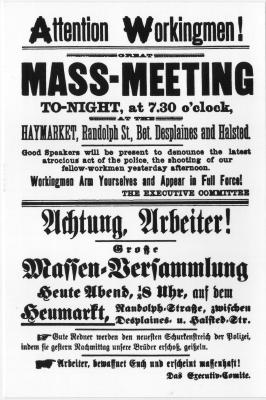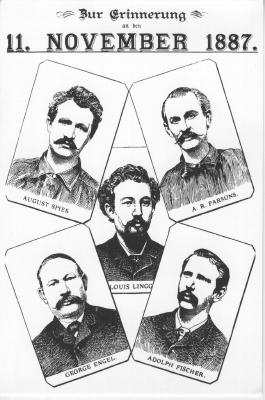Imagine work from six a.m. to eight p.m., six days a week: fourteen hours straight through, never in the sunlight, a glimpse at the family before bed, no chance for recreation but perhaps a beer to dull the pain and bring sleep. Then back to the endless job. Such as it was in the U.S. in the 1880's. A fourteen hour day, eighty-four hours a week, was the norm. Nine year old children worked through the day next to their adult counterparts. They might peek through grimy windows in textile mills to watch their unemployed parents stand in soup lines. Child labor was cheap and those with fourteen hour days were often envied.
So it could be today. But stiff and sleepless, in clandestine meetings and open demonstrations, working people organized. In the forefront of the fight were radicals, anarchists and communists who raised the demand for a shorter work week, "The Eight Hour Day," and who sought to someday, "Abolish the wage system!" Many of them, first-generation European Marxists, founded the unions which live on today. The center of their activity was Chicago. There, on May 1 1886, they called for a national strike for the eight hour day. 350,000 people joined the strike across the country. Tools lay silent. No smoke rose from the mills. In Detroit, 11,000 people marched in the Eight-Hour parade. At the McCormick Harvester Plant in Chicago, the strike
boiled over
beyond the one day action. The owners decided to bring the strike to a
halt. On May 3rd, 500 police attacked a picket line, firing
randomly at the workers. Six were killed, scores wounded. A protest
demonstration
was scheduled for the next morning in Haymarket Square. It rained that
night. Around 3,000 people turned out to hear their leaders denounce
the
police attack. As the crowd began to disperse, someone (quite possible
a police agent) tossed a bomb into the ranks of the cops. They opened
fire,
killing four workers on the spot. More than one hundred were
wounded.
In the aftermath, frenzied police raided meeting halls, union offices, and private homes. Dozens of unionists and activists were arrested. Eight radicals, Albert Parsons, Adolph Fisher, George Engle, Louis Lingg, Oscar Neebe, Sam Felden, August Spies, and Eugene Schwab were charged with murder. Seven of them were not present when the bomb was thrown. The eighth, Felden, was in the midst of his speech on a platform, in full view of the police, at the time of the explosion. They were charged with "influencing" whoever did the bombing.
Yet the conditions which led to May Day, world-wide, remain substantially unchanged. While the eight-hour day is won on paper in the U.S., in reality thousands work forced overtime while others double up on part-time employment or work for the largest employer: temp agencies. Two incomes are necessary to support a family. With a little slight of hand, eight hours a day becomes sixteen. Reforms slip away. But the movement which rose up from the initial May Day incident, Haymarket, is alive. As the songwriter of the Industrial Workers of the World, Joe Hill, wrote in one of his most powerful songs in the early 1900's: Workers of the world, awaken!
The Rouge Forum is a group of educators, workers, students, and parents seeking a democratic society. We are concerned about questions like these: How can we teach against racism, national chauvinism and sexism in an increasingly authoritarian and undemocratic society that promises its citizens perpetual war? How can we gain enough real power to keep our ideals and still teach--or learn? Whose interests shall school serve in a society that is ever more unequal? We are both research and action oriented. We want to learn about equality, democracy and social justice as we simultaneously struggle to bring into practice our present understanding of what that is. We seek to build a caring inclusive community which understands that an injury to one is an injury to all. At the same time, our caring community is going to need to deal decisively with an opposition that is sometimes ruthless. We hope to demonstrate that the power necessary to win greater democracy will likely rise out of an organization that unites people in new ways--across union boundaries, across community lines, across the fences of race and sex/gender. We believe that good humor and friendships are a vital part of building this kind of organization, as important as theoretical clarity. Friendships allow us to understand that action always reveals errors--the key way we learn. We chose Brer Rabbit as a symbol to underline the good cheer that rightfully guides the struggle for justice. Every part of the world is our briar patch. We know that we must recapture our history if we are to understand the possibilities of the future. Join Us!
|




